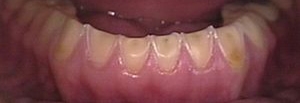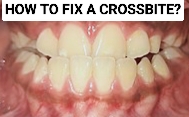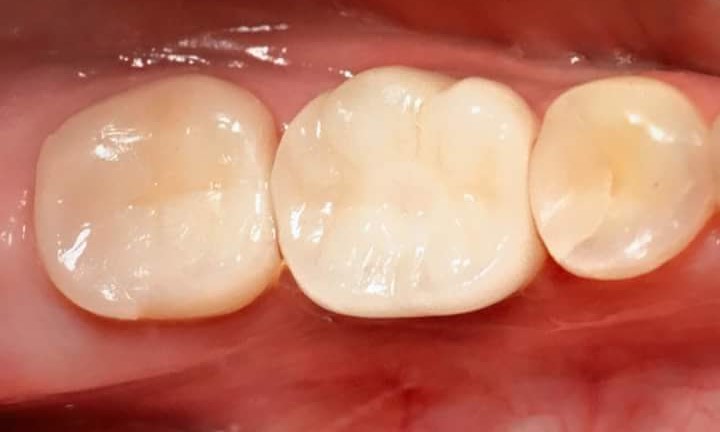What are worn down teeth?
Worn down teeth refer to teeth that have lost some of their enamel, which is the hard, protective outer layer of the tooth. This can be referred to as attrition, abrasion or erosion. This can cause the teeth to appear shorter, flatter or smaller than usual.

What causes worn down teeth?
There are several possible causes of worn down teeth, including:
1. Teeth Grinding (Bruxism):
This is a condition where the patient grinds or clenches their teeth together, often unconsciously, and leads to gradual wear and tear of the teeth over time. This can result in flat, worn down teeth, as well as headaches and other jaw-related problems.
2. Acid Erosion:
Acid from the foods we eat and drinks we consume can erode the enamel of the teeth, leading to premature wear and tear. Tooth decay and gum disease can also result from acid erosion, as well as receding gums.
3. Age:
Over time, the teeth naturally wear down and become less effective at doing their job. By the time people reach old age, teeth can appear flatter as a result of use and decrease in enamel.
4. Dental Procedures:
Tooth wear can be a side effect of certain dental procedures like orthodontic treatment.
5. Abrasion:
Abrasive toothpaste or brushing too hard can excessively wear away the enamel of the teeth and cause teeth to be weakened.
Worn down teeth can cause more than just cosmetic issues. They can also cause sensitivity and discomfort when chewing, speaking, or even breathing. If you’re dealing with worn down teeth, it’s important to explore your options for fixing them.
ILL EFFECTS OF WORN DOWN TEETH
Worn down teeth can lead to a variety of negative effects, including:
1. Sensitivity: The dentin layer (the layer beneath the enamel) of the tooth may be exposed due to the wear. This can lead to sensitivity to hot or cold foods and drinks.
2. Bite problems: Worn teeth can affect the way the upper and lower teeth come together, leading to bite problems. This can cause discomfort when chewing and can also lead to jaw pain.
3. Tooth decay: As the enamel gets worn down, the risk of tooth decay increases. The weakened enamel is more susceptible to bacterial attack, which can lead to cavities.
4. Gum disease: When teeth are worn down, it can make it difficult to properly clean between them, increasing the risk of gum disease.
5. Aesthetics: Worn down teeth can affect the appearance of the smile, leading to self-consciousness and decreased confidence.
If you are experiencing any of these negative effects, it is important to seek dental treatment to prevent further damage to your teeth and to promote overall oral health.
GRADES OF WORN DOWN TEETH
There is no definitive grading system for worn down teeth, as the severity of tooth wear can vary widely depending on the underlying cause and other factors. However, dentists may classify worn teeth into different categories based on their appearance, the extent of the wear, and the potential for future damage. Here are some potential classifications:
1. Class I Wear:
In this category, the wear is limited to the tooth enamel and does not affect the dentin layer beneath it. This type of wear is usually reversible with proper dental treatment.
2. Class II Wear:
This category involves enamel loss that has progressed to the underlying dentin layer but does not affect the nerve of the tooth. Treatment may involve bonding or veneers to restore the tooth’s shape and function.
3. Class III Wear:
In this category, the wear has progressed to the point where the nerve of the tooth is exposed, leading to sensitivity. Treatment may involve a root canal and a crown to restore the function of the tooth.
4. Class IV Wear:
This category involves severe wear that has led to the loss of significant tooth structure, making it difficult to restore the tooth’s natural shape and function. Treatment may involve a combination of a root canal, crown lengthening, and various dental restorations to reconstruct the tooth.
It’s important to remember that every case is unique, and a dentist will carefully evaluate the extent of tooth wear and recommend an appropriate course of treatment based on the individual patient’s needs and goals.

How to fix worn down teeth?
Here are some tips for fixing worn down teeth.
1. Dental Bonding
Dental bonding is a popular and affordable cosmetic dentistry option that can help fix worn down teeth. In this procedure, a tooth-colored resin is applied and shaped to the tooth, and then hardened with a special light. The result is a natural looking tooth that is more resistant to wear and tear.
2. Crowns
For more severe cases of worn down teeth, a crown may be necessary. A crown is a cap that covers the entire tooth, providing protection and support. Crowns are typically made from porcelain or ceramic, and can last for many years with proper care.
3. Veneers
Veneers are thin shells that are custom-made to fit over the front of the teeth. They are often used to fix cosmetic issues, but can also be used to protect worn down teeth. Veneers can be made from porcelain or resin, and can give you a natural-looking, long-lasting solution.
4. Bite Adjustment
Sometimes, worn down teeth are caused by an uneven bite. This can be corrected through bite adjustment, which involves using dental tools to reshape the teeth and adjust how they fit together. This procedure is quick and relatively painless, and can help prevent future wear and tear on the teeth.
5. Gum Grafting
In some cases, worn down teeth are caused by receding gums. This can be corrected through gum grafting, which involves taking tissue from elsewhere in the mouth and grafting it onto the receded area. This can help protect the tooth root and prevent further wear and tear.
Conclusion
Overall, there are many options for fixing worn down teeth. The best solution for you will depend on the severity of the wear, your budget, and your preferences. Talk to your dentist about your options and decide on a treatment plan that works for you.
FAQs
Here are some frequently asked questions about worn down teeth:
Q: What causes teeth to become worn down?
A: Worn teeth can be caused by a variety of factors, including bruxism (tooth grinding), aging, acid erosion from acidic foods or drinks, and improper brushing or flossing techniques. In some cases, certain medical conditions or medications can also contribute to tooth wear.
Q: What are some signs of worn down teeth?
A: Signs of worn down teeth include increased tooth sensitivity, changes in the way the bite feels, uneven teeth, chipped or cracked teeth, and a flattening or shortening of the teeth. Patients may also experience jaw pain or headaches.
Q: How are worn down teeth treated?
A: Treatment for worn down teeth depends on the severity and underlying cause of the wear. Options may include dental bonding, veneers, crowns, or orthodontic treatment. In cases where bruxism is the underlying cause, a dentist may recommend a custom night guard to protect the teeth from further damage.
Q: Can worn down teeth be prevented?
A: Yes, there are several ways to prevent teeth from becoming worn down, including practicing good oral hygiene, avoiding acidic foods and drinks, wearing a custom night guard if bruxism is an issue, and seeking prompt dental treatment for any dental problems.
Q: Can worn down teeth be corrected?
A: Yes, there are various dental treatments available to correct worn down teeth, depending on the severity of the wear and the patient’s individual needs. It is important to schedule a consultation with a dentist to determine the best course of treatment for your specific case.




